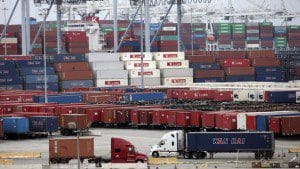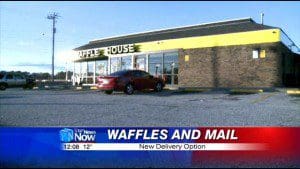 The times they are a-changing. This week’s news reflects some major changes, especially in the retail world. The West Coast port work stoppage has come to an end with a formal agreement in place after 9+ months of discussions. Major retailers are branching into new, and often unlikely spaces, as the global e-commerce market soars. The commercial drone industry finally has an initial set of regulations in place, which now opens a 60 day comment period. Amazon, for one, is none too happy with the proposal. And finally, this weekend marks the end of February. For those of us in the frozen landscape of New England, it means that the end is in sight. Spring will be here soon, and we can finally move on from a record-setting winter. Yes, the times they are a-changing.
The times they are a-changing. This week’s news reflects some major changes, especially in the retail world. The West Coast port work stoppage has come to an end with a formal agreement in place after 9+ months of discussions. Major retailers are branching into new, and often unlikely spaces, as the global e-commerce market soars. The commercial drone industry finally has an initial set of regulations in place, which now opens a 60 day comment period. Amazon, for one, is none too happy with the proposal. And finally, this weekend marks the end of February. For those of us in the frozen landscape of New England, it means that the end is in sight. Spring will be here soon, and we can finally move on from a record-setting winter. Yes, the times they are a-changing.
And now, on to the news.
- West Coast labor fight comes to an end
- Drone industry likes FAA plan; Amazon left out
- Local outlets win in e-tailers race for last mile delivery
- Farmers markets going virtual
- How Waffle House could replace your post office
- eBay signs click-and-collect partnership with Woolworths
 At least for now, the West Coast port labor fight has come to end. The owners of the 29 West Coast ports and the dockworkers union have reached a tentative deal for a new contract. As a result, the port can begin to work through the backlog of stalled goods waiting on the docks and out at sea to get operations back to normal. While this is good news for retailers, manufacturers, and agricultural exporters, the road to recovery will not be quick. Analysts predict it will take months for operations to normalize, and the flow of goods through the ports will be slow going for the foreseeable future. All parties involved in the deal know that this is certainly not the end of worry over future confrontations.
At least for now, the West Coast port labor fight has come to end. The owners of the 29 West Coast ports and the dockworkers union have reached a tentative deal for a new contract. As a result, the port can begin to work through the backlog of stalled goods waiting on the docks and out at sea to get operations back to normal. While this is good news for retailers, manufacturers, and agricultural exporters, the road to recovery will not be quick. Analysts predict it will take months for operations to normalize, and the flow of goods through the ports will be slow going for the foreseeable future. All parties involved in the deal know that this is certainly not the end of worry over future confrontations.
 The FAA revealed a proposal over the regulation of commercial drones in the US. The proposal would allow commercial drones up to 55 pounds to fly within sight of their pilots up to 500 feet high at speeds as fast as 100 mph. The remote pilots must be at least 17 years old and would have to get certificates by passing a test of aeronautic knowledge and a vetting by the Transportation Security Administration. Many people are happy with the proposal. Brian Wynne, CEO of the trade group Association for Unmanned Vehicle Systems International, called the proposal a milestone toward remote-controlled aircraft sharing the skies with passenger planes. Amazon and Google however, are not so happy.
The FAA revealed a proposal over the regulation of commercial drones in the US. The proposal would allow commercial drones up to 55 pounds to fly within sight of their pilots up to 500 feet high at speeds as fast as 100 mph. The remote pilots must be at least 17 years old and would have to get certificates by passing a test of aeronautic knowledge and a vetting by the Transportation Security Administration. Many people are happy with the proposal. Brian Wynne, CEO of the trade group Association for Unmanned Vehicle Systems International, called the proposal a milestone toward remote-controlled aircraft sharing the skies with passenger planes. Amazon and Google however, are not so happy.
“That means we really are not talking about unmanned aerial vehicles. We are talking about something that has to have a person. It defeats the whole purpose,” said Michael E. Drobac, executive director of the Small Unmanned Aerial Vehicle Coalition, of which Amazon, Google and GoPro are members.
In Hyderabad, India, the logistics side of e-commerce has been a challenge. Local convenience stores and gas stations are stepping in to try to save the day. Third party logistics providers are working with local shops to establish e-commerce hubs in neighborhoods in smaller cities. Rather than developing complicated supply chains to ensure home delivery across the region, retailers can now deliver goods to small local stores for convenient pick-up by the customer. This plan allows the local business to serve a major role in the last mile of delivery while enabling retailers and logistics players to save money on their supply chain operations.
 Online food shopping has been growing at a rapid pace in the last few years. And now, an unlikely retailer is entering the space: Overstock. Known for selling surplus and returned items through its e-commerce site, Overstock.com is now a player in the online grocery space. But instead of working with traditional supermarkets like other retailers, Overstock is taking a different approach. Overstock is working directly with farmer’s markets to deliver “locally grown, farm fresh food.” The program works with local farmers to deliver food directly to customers. Overstock handles the delivery of the order to customers and uses a profit-sharing program to compensate farmers. With an increasing focus on local and sustainable food sources, Overstock has put itself in a great place for growth in the grocery space.
Online food shopping has been growing at a rapid pace in the last few years. And now, an unlikely retailer is entering the space: Overstock. Known for selling surplus and returned items through its e-commerce site, Overstock.com is now a player in the online grocery space. But instead of working with traditional supermarkets like other retailers, Overstock is taking a different approach. Overstock is working directly with farmer’s markets to deliver “locally grown, farm fresh food.” The program works with local farmers to deliver food directly to customers. Overstock handles the delivery of the order to customers and uses a profit-sharing program to compensate farmers. With an increasing focus on local and sustainable food sources, Overstock has put itself in a great place for growth in the grocery space.
 Two more retailers are entering new business ventures as well: Waffle House and Woolworths. Waffle House, a breakfast restaurant based in the US, is entering a new business – delivering mail. The restaurant chain is attempting to compete with the USPS, FedEx, and UPS. The plan is take a page from Uber’s playbook and use its restaurants as drop-off locations. Using an app developed by Roadie Inc., customers can find drivers already heading towards their package’s destination. The drivers will then deliver the package to Waffle House locations, where customers will retrieve it. Rather than getting paid, drivers receive a free waffle when they download the app and free drink when they make a delivery.
Two more retailers are entering new business ventures as well: Waffle House and Woolworths. Waffle House, a breakfast restaurant based in the US, is entering a new business – delivering mail. The restaurant chain is attempting to compete with the USPS, FedEx, and UPS. The plan is take a page from Uber’s playbook and use its restaurants as drop-off locations. Using an app developed by Roadie Inc., customers can find drivers already heading towards their package’s destination. The drivers will then deliver the package to Waffle House locations, where customers will retrieve it. Rather than getting paid, drivers receive a free waffle when they download the app and free drink when they make a delivery.
At the same time, Australia based retailer Woolworth’s has inked a deal with eBay to serve as pick-up locations for orders. The service will initially be available to eBay buyers living in Sydney and Tasmania. They will have the choice to collect their orders from more than 90 Woolworths and Big W stores located across both cities. eBay and Woolworths predict that up to 12,000 sellers will be involved in the new click-and-collect service, based on Woolworths’ claim that 91 percent of Australians currently live within 10 kilometers of one of its stores. These two agreements show the changing nature of supply chain logistics. Click-and-collect is becoming a larger portion of businesses for retailers, and will only continue to grow as the global e-commerce market does as well.
That’s all for this week. Enjoy the weekend and the song of the, The Times They Are A-Changing by Bob Dylan.
https://www.youtube.com/watch?v=abGzxWuLQP8

















Leave a Reply